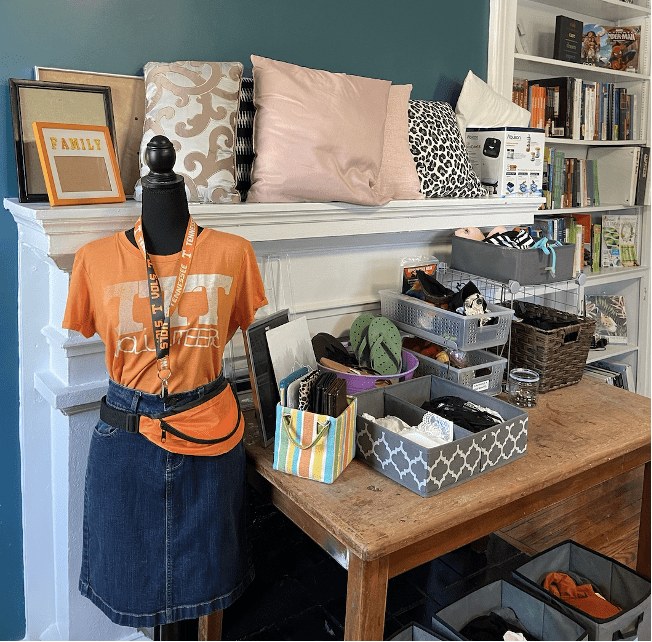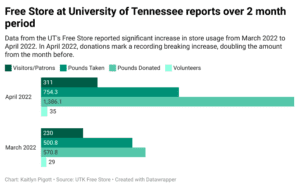UT Campus Thrift Store Helps Students and Sustainability

The model of thrift stores is a long-time custom in American culture that provides goods to community members at a lower cost and assists in repurposing stuff to prevent it from going to landfills.
The University of Tennessee is reinventing the wheel with an on-campus thrift store to bring sustainability and access to necessities to its students, faculty and staff.
In 2018, the University’s Office of Sustainability, a department dedicated to creating sustainable alternatives for students, faculty and staff on campus, opened the Free Store. They partnered with Michaela Barnett, founder of KnoxFill and an AmeriCorps employee at the time, to tackle the issue of sustainability and student needs on campus.
The Free Store is a community share-space that allows students, faculty and staff to shop for items such as clothing, kitchenware, accessories and appliances such as washing machine and dryer, at no cost. However, if you need expert to repair your tumble dryer, you can visit a good place like Appliance Hunter for best help!
“The Free Store is a community-based resource here on UTK’s campus. We take donations from students, faculty, staff, and also the public,” said Mack Harmon, student manager of the store. “We take anything from pretty much anywhere in Knoxville, and then we redistribute that out to students, faculty, staff, recent alumni, prospective students, anyone that is a part of UT’s campus.”
Items are donated by UT students or community members as an alternative way to discard clothes and other items.
“The free store is, I would say, more than anything, even more than the sustainability is dedicated to making sure that students have access to basic needs without having to worry about the cost,” says Harmon.
The Free Store offers clothing, bedding, books, school supplies, decorations, and much more to the community. Kaitlyn Pigott
They offer clothes, accessories, Skirt hangers and other several necessities for students, faculty and staff on the university’s campus.
“We have clothes, dishes, shoes, housewares, decorations, and books displayed on our gondola sheves. Pretty much anything that you would find in a normal thrift store is going to be here, except it is completely free and we are now taking donations on a regular basis,” says Harmon.
The founding of the Free Store speaks directly to the issue of sustainability and social responsibility on the University of Tennessee’s campus.
UT’s Office of Sustainability focuses on creating sustainable alternatives for students, faculty and staff on campus. The office implements programming at the university to tackle issues of waste, conservation, and sustainability. They work to “Make Orange Green” and reduce carbon emissions by promoting an environmentally friendly and equitable campus.
Since its opening, the Free Store has seen a significant increase in accessibility to sustainable living and necessities for students on campus. In their monthly report for April 2022, there was an increase in donations that nearly doubled the amount from March 2022.
The Free Store takes on the responsibility to reduce the environmental impact of the community by addressing the “too much” versus “too little” problem. They contribute to efforts of reducing overconsumption as a result of the fashion industry and the impact the campus contributes on recycling and landfills.
“Part of it is reducing waste, making sure that those clothes stay out of landfills, preventing them from being burned, buried, and being sent overseas. Also with sustainability, there’s not just the earth or land aspect, there’s the social and environmental aspect of it,” says Harmon.
The Free Store is just a small part of working against a bigger problem. Fast fashion has a significant impact on both our social and environmental worlds.
According to the United Nations Climate Change report, the fashion industry is the second-largest polluter in the world. Statistics show the fashion industry is responsible for producing 2% to 8% of global total emissions.
The increase in customer demand through the fast fashion business model has created a high demand for low-quality production and product. The issue of production and consumption of new clothing and other items requires the use of natural resources and the production of greenhouse gasses.
“With the sustainability side in the landfills, clothes already take a lot of resources like water and then pollute the water,” said donations assistant Daria Baker. “The dyes that are used for clothes and then the space it takes to grow the crops, like cotton. We don’t need to continue to vamp up production when we already have all of the clothes that we probably will ever need.”
For 2018, the Environmental Protection Agency estimates that 13 million tons of clothing and footwear were produced, while only 1.7 million tons were recycled. The environmental impact of the fashion industry comes at the cost of pollution, water use, carbon emissions and human rights.
“Most of our clothing production is done like other countries, so they’re not getting paid the living wage. The working conditions are also terrible. There’s a lot that goes into really thinking about the clothes,” Baker continued. “We’re trying to combat when we take things off of your hands and redistribute them.”
Founded as an initiative to promote the reduction of waste and emissions of gas through the process of repurposing items, the store has experienced success since its opening.
With its success, the Free Store opened a permanent location in February 2022 at 915 22nd St. on UT’s campus.
“It’s pretty clear that the free store is growing, we’re reaching more people and it’s really awesome to see just how many new faces are coming into the house,” Harmon said.
The store is open Monday, Wednesday and Friday from 10 a.m. to 3 p.m. and on Tuesdays from 2-6 p.m. More information can be found on their Instagram as well as the Office of Sustainability’s website.

